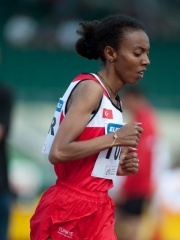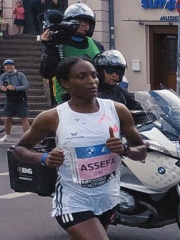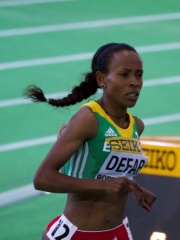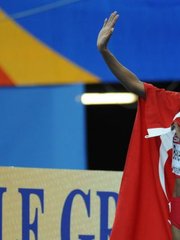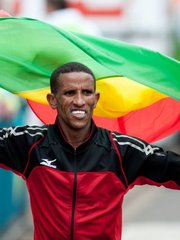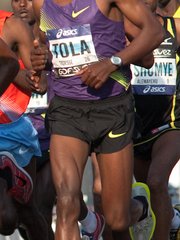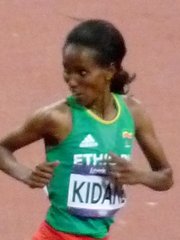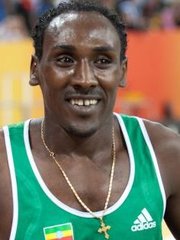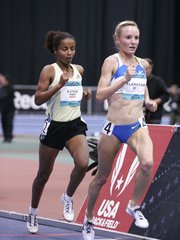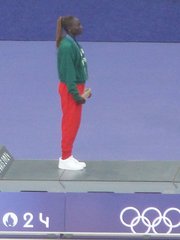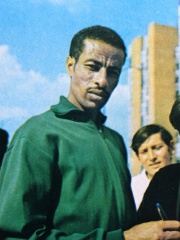
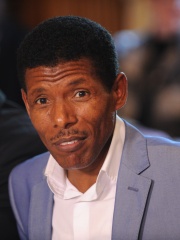
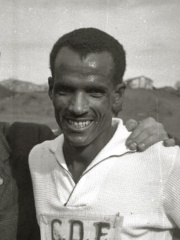
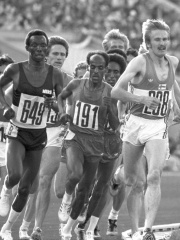
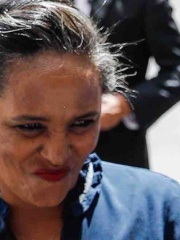
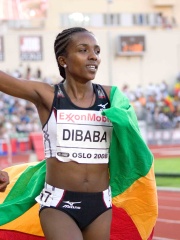
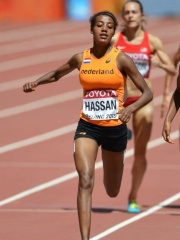

The Most Famous
ATHLETES from Ethiopia
Top 10
The following people are considered by Pantheon to be the top 10 most legendary Ethiopian Athletes of all time. This list of famous Ethiopian Athletes is sorted by HPI (Historical Popularity Index), a metric that aggregates information on a biography's online popularity. Visit the rankings page to view the entire list of Ethiopian Athletes.

1. Abebe Bikila (1932 - 1973)
With an HPI of 75.20, Abebe Bikila is the most famous Ethiopian Athlete. His biography has been translated into 59 different languages on wikipedia.
Shambel Abebe Bikila (Amharic: ሻምበል አበበ ቢቂላ; August 7, 1932 – October 25, 1973) was an Ethiopian marathon runner who was a back-to-back Olympic marathon champion. He was the first Ethiopian Olympic gold medalist, winning his first gold medal at the 1960 Summer Olympics in Rome while running barefoot. At the 1964 Tokyo Olympics, he won his second gold medal, making him the first athlete to successfully defend an Olympic marathon title. In both victories, he ran in world record time. Born in Shewa, Abebe moved to Addis Ababa around 1952 and joined the 5th Infantry Regiment of the Ethiopian Imperial Guard, an elite infantry division that safeguarded the emperor of Ethiopia. Abebe served in the Kagnew Battalion during the Korean War. Enlisting as a soldier before his athletic career, he rose to the rank of shambel (captain). Abebe participated in a total of sixteen marathons. He placed second on his first marathon in Addis Ababa, won twelve other races, and finished fifth in the 1963 Boston Marathon. In July 1967, he sustained the first of several sports-related leg injuries that prevented him from finishing his last two marathons. Abebe was a pioneer in long-distance running. Mamo Wolde, Juma Ikangaa, Tegla Loroupe, Paul Tergat, and Haile Gebrselassie—all recipients of the New York Road Runners' Abebe Bikila Award—are a few of the athletes who have followed in his footsteps to establish East Africa as a force in long-distance running. On March 22, 1969, Abebe was paralysed due to a car accident. He regained some upper-body mobility, but he never walked again. While he was receiving medical treatment in England, Abebe competed in archery and table tennis at the 1970 Stoke Mandeville Games in London. Those games were an early predecessor of the Paralympic Games. He competed in both sports at a 1971 competition for disabled people in Norway and won its cross-country sleigh-riding event. Abebe died at age 41 in 1973 of a cerebral haemorrhage related to his accident four years earlier. He received a state funeral, and Emperor Haile Selassie declared a national day of mourning. Many schools, venues, and events, including Abebe Bikila Stadium in Addis Ababa, are named after him. He is the subject of biographies and films documenting his athletic career, and he is often featured in publications about the marathon and the Olympics.

2. Haile Gebrselassie (b. 1973)
With an HPI of 60.45, Haile Gebrselassie is the 2nd most famous Ethiopian Athlete. His biography has been translated into 61 different languages.
Haile Gebrselassie (Amharic: ኀይሌ ገብረ ሥላሴ, romanized: Haylē Gebre Silassē; born 18 April 1973) is an Ethiopian former long-distance track, road running athlete, and businessman. He won two Olympic gold medals and four World Championship titles over the 10,000 metres. Haile triumphed in the Berlin Marathon four times consecutively and also had three straight wins at the Dubai Marathon. He also earned four world titles indoors and was the 2001 World Half Marathon Champion. He is considered to be one of the greatest long distance runners of all time. Haile had major competition wins at distances between 1,500 metres and the marathon, moving from outdoor, indoor and cross country running to road running in the latter part of his career. He broke 61 Ethiopian national records, ranging from 800 metres to the marathon, set 27 world records, and is regarded as one of the greatest long distance runners in history. He won the 2008 Berlin Marathon with a world record time of 2:03:59, breaking his own world record by 27 seconds. The record stood for three years. Haile's 10,000 m Masters age group world record remains unchallenged since 2008. Due to his various achievements on track & road running events, many called him as the "Emperor of the Distance Running". Beyond his athletic achievements, he is a successful businessman, contributing to the development of his home country. Haile was cited as one of the top 100 most influential Africans by New African in 2011. During the Hachalu Hundessa riots in 2020, Oromo mobs targeted the businesses and properties of non-Oromos. Haile's hotels and resort were burned and 400 employees lost their jobs. In 2021, in the midst of the Tigray War, he pledged to join the fighting against the Tigray People's Liberation Front.

3. Mamo Wolde (1932 - 2002)
With an HPI of 60.00, Mamo Wolde is the 3rd most famous Ethiopian Athlete. His biography has been translated into 28 different languages.
Degaga "Mamo" Wolde (Amharic: ማሞ ወልዴ; 12 June 1932 – 26 May 2002) was an Ethiopian long-distance runner who competed in track, cross-country, and road running events. He was the winner of the marathon at the 1968 Summer Olympics.

4. Miruts Yifter (1944 - 2016)
With an HPI of 59.94, Miruts Yifter is the 4th most famous Ethiopian Athlete. His biography has been translated into 28 different languages.
Miruts Yifter (Amharic and Tigrinya: ምሩፅ ይፍጠር, affectionately known as "Yifter the Shifter", 15 May 1944 – 22 December 2016) was an Ethiopian long-distance runner and winner of two gold medals at the 1980 Summer Olympics. His date of birth is often given as 15 May 1944, though there is some uncertainty about this. His name is also sometimes spelled as Muruse Yefter.
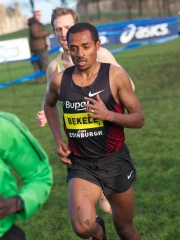
5. Kenenisa Bekele (b. 1982)
With an HPI of 57.11, Kenenisa Bekele is the 5th most famous Ethiopian Athlete. His biography has been translated into 51 different languages.
Kenenisa Bekele Beyecha (Oromo: Qananiisaa baqqalaa; Amharic: ቀነኒሳ በቀለ; born 13 June 1982) is an Ethiopian long-distance runner. He was the world record holder in both the 5,000-metre and 10,000-metre from 2004 until 2020. He won the gold medal in both the 5,000 m and 10,000 m events at the 2008 Beijing Olympics. At the 2004 Olympics, he won the gold medal in the 10,000 m and the silver medal in the 5,000 m. He is the most successful runner in the history of the IAAF World Cross Country Championships, with six long (12 km) course and five short (4 km) course titles. He won the 10,000 m title at the World Championships in Athletics in 2003, 2005, 2007 and 2009 (matching Haile Gebrselassie's four in a row win streak). Kenenisa was unbeaten over 10,000 m from his debut in 2003 until 2011, when he failed to finish at the World Championships final. At the 2009 World Championships in Athletics he became the first man to win both 5000 m and 10,000 m title at the same championships. Over 5000 m he has also won an Olympic silver (2004), World Championship bronze (2003), two African Championship titles and one All-Africa Games gold medal. He also won the 3000 metres title at the 2006 World Indoor Championships. On 6 April 2014, he produced the sixth fastest marathon debut ever on a record-eligible course with his victory at the Paris Marathon, in a course record time of 2:05:04. On 25 September 2016, Kenenisa won the Berlin Marathon in a time of 2:03:03, a new personal best, then the third-fastest marathon of all time. On 29 September 2019, he again won the Berlin Marathon in a time of 2:01:41, two seconds slower than the then world record of 2:01:39 set by Eliud Kipchoge in the 2018 Berlin Marathon. Considering his accomplishments in cross country, track, and road racing, many consider him to be the greatest distance runner of all time.

6. Derartu Tulu (b. 1972)
With an HPI of 51.91, Derartu Tulu is the 6th most famous Ethiopian Athlete. Her biography has been translated into 35 different languages.
Derartu Tulu NL COL (Oromo: Daraartuu Tulluu, Amharic: ደራርቱ ቱሉ; born 21 March 1972) is an Ethiopian former long-distance runner, who competed in track, cross country running, and road running up to the marathon distance. Derartu is the first Ethiopian woman and the first black African woman to win an Olympic gold medal. She won 10,000 metres titles at the 1992 Barcelona and 2000 Sydney Olympics, and a bronze in the event at the 2004 Athens Olympics. At the World Championships in Athletics, Derartu took silver in the 10,000 m in 1995, and a gold in 2001. She was a three-time IAAF World Cross Country champion (1995, 1997, 2000). She was serving as the President of Ethiopian Athletics Federation from 2018 to 2024. She was succeeded by Sileshi Sihine. Her replacement cited as a response to controversy surrounding the federation stance during 2024 Summer Olympics in Paris. Derartu comes from a sporting family of several Olympic medalists, which include her cousins Tirunesh, Genzebe and Ejegayehu Dibaba.

7. Tirunesh Dibaba (b. 1985)
With an HPI of 50.76, Tirunesh Dibaba is the 7th most famous Ethiopian Athlete. Her biography has been translated into 46 different languages.
Tirunesh Dibaba (Oromo: Xirunesh Dibaabaa, Amharic: ጥሩነሽ ዲባባ ቀነኒ; born 1 October 1985) is an Ethiopian long-distance runner athlete who competes in long-distance track events and international road races. She has won three Olympic track gold medals, five World Championship track gold medals, four individual World Cross Country (WCC) adult titles, and one individual WCC junior title. Tirunesh was the 5,000 metres (outdoor track) world record holder until 2020. She is nicknamed the "baby-faced destroyer." At the 2005 IAAF World Championships in Helsinki, Finland, Tirunesh became the first woman to win the 5000 m and 10000 m at the same championship. She is the one of two women (the other Sonia O'Sullivan) who won the short and long course World Cross Country title at the same championship (2005 in Saint-Galmier, France). With her 2003 World championship title, she became the youngest World Champion at the age of 18 years and 90 days. Tirunesh comes from a sporting family of several Olympic medalists, which includes her sisters Genzebe, Ejegayehu and Anna, and her cousin, Derartu Tulu. The matriarch of the Dibaba athletics dynasty, Tirunesh is the most decorated of the family.

8. Sifan Hassan (b. 1993)
With an HPI of 50.16, Sifan Hassan is the 8th most famous Ethiopian Athlete. Her biography has been translated into 44 different languages.
Sifan Hassan (Oromo: Siifan Hassan; born January 1993 in Ethiopia) is an Ethiopian-Dutch middle- and long-distance runner. She is most recognized for her versatility in running championship and world-leading performances in widely disparate distances. She completed an unprecedented triple at the 2020 Tokyo Olympics, winning gold medals in both the 5,000 metres and 10,000 metres and a bronze medal for the 1,500 metres. Hassan is the only athlete in Olympic history to win medals across a middle-distance event and both long-distance races in a single Games. She is only the second of three women to complete an Olympic distance double. At the Paris 2024 Olympics, Hassan secured a bronze medal in both the women's 5,000 m and 10,000 m events and gold in the women's marathon, becoming the only woman to win the Olympic gold medal in the 5,000 metres, 10,000 metres and Marathon races. At the World Athletics Championships, Hassan took 1,500 m and 10,000 m titles in 2019, becoming the only athlete (male or female) in history to win both events at a single World Championships or Olympic Games. She won a bronze at the 1500 m in 2015, and at the 5000 m in 2017, when she also finished fifth in the 1,500 m. Hassan is a three-time World Indoor Championships medallist, winning gold at 1500 m in 2016 as well as silver at 3000 m and bronze for 1500 m in 2018. She earned six European medals (including two cross country titles), and one European indoor medal. She is also a three-time Diamond League winner, having secured the 1500 m/5000 m double in 2019. In her debut over the classic 26.2-mile distance, she won the 2023 London Marathon. Hassan has been the world record holder for the one hour run since 2020. She held the world record for the one mile on the track from July 2019 to July 2023, when Faith Kipyegon overtook it. She held a world record at 10,000 m for two days in June 2021. She holds six European records (1500 m, 3000 m, 5000 m, 10,000 m, half marathon, marathon) and three other Dutch records.

9. Eshetu Tura (b. 1950)
With an HPI of 49.64, Eshetu Tura is the 9th most famous Ethiopian Athlete. His biography has been translated into 18 different languages.
Eshetu Tura (Amharic: አሸቱ ቱራ, born 19 January 1950) is a retired long-distance runner from Ethiopia. He won a bronze medal in 3,000 metres steeplechase at the 1980 Summer Olympics.
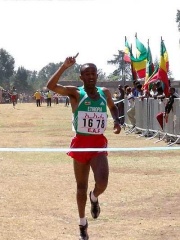
10. Addis Abebe (b. 1970)
With an HPI of 48.24, Addis Abebe is the 10th most famous Ethiopian Athlete. His biography has been translated into 18 different languages.
Addis Abebe (Amharic: አዲስ አበበ; born September 5, 1970) is a former long-distance runner from Ethiopia, best known for winning a bronze medal in the 10,000 metres event at the 1992 Summer Olympics. In the 1988 World Junior Championships, Abebe won the gold medal in the 10,000 metres and a bronze in the 5,000 meters events.
People
Pantheon has 95 people classified as Ethiopian athletes born between 1932 and 2002. Of these 95, 91 (95.79%) of them are still alive today. The most famous living Ethiopian athletes include Haile Gebrselassie, Kenenisa Bekele, and Derartu Tulu. The most famous deceased Ethiopian athletes include Abebe Bikila, Mamo Wolde, and Miruts Yifter. As of April 2024, 10 new Ethiopian athletes have been added to Pantheon including Alemitu Bekele Degfa, Layes Abdullayeva, and Yemane Tsegay.
Living Ethiopian Athletes
Go to all RankingsHaile Gebrselassie
1973 - Present
HPI: 60.45
Kenenisa Bekele
1982 - Present
HPI: 57.11
Derartu Tulu
1972 - Present
HPI: 51.91
Tirunesh Dibaba
1985 - Present
HPI: 50.76
Sifan Hassan
1993 - Present
HPI: 50.16
Eshetu Tura
1950 - Present
HPI: 49.64
Addis Abebe
1970 - Present
HPI: 48.24
Fatuma Roba
1973 - Present
HPI: 47.12
Elvan Abeylegesse
1982 - Present
HPI: 45.71
Tigst Assefa
1996 - Present
HPI: 45.64
Meseret Defar
1983 - Present
HPI: 45.33
Fita Bayisa
1972 - Present
HPI: 45.18
Deceased Ethiopian Athletes
Go to all RankingsAbebe Bikila
1932 - 1973
HPI: 75.20
Mamo Wolde
1932 - 2002
HPI: 60.00
Miruts Yifter
1944 - 2016
HPI: 59.94
Abadi Hadis
1997 - 2020
HPI: 30.12
Newly Added Ethiopian Athletes (2025)
Go to all RankingsAlemitu Bekele Degfa
1977 - Present
HPI: 37.66
Layes Abdullayeva
1991 - Present
HPI: 35.67
Yemane Tsegay
1985 - Present
HPI: 35.54
Tadese Tola
1987 - Present
HPI: 34.54
Werknesh Kidane
1981 - Present
HPI: 32.08
Deresse Mekonnen
1987 - Present
HPI: 32.04
Sentayehu Ejigu
1985 - Present
HPI: 31.74
Mimi Belete
1988 - Present
HPI: 30.91
Shitaye Eshete
1990 - Present
HPI: 29.34
Tsige Duguma
2001 - Present
HPI: 28.42
Overlapping Lives
Which Athletes were alive at the same time? This visualization shows the lifespans of the 4 most globally memorable Athletes since 1700.


